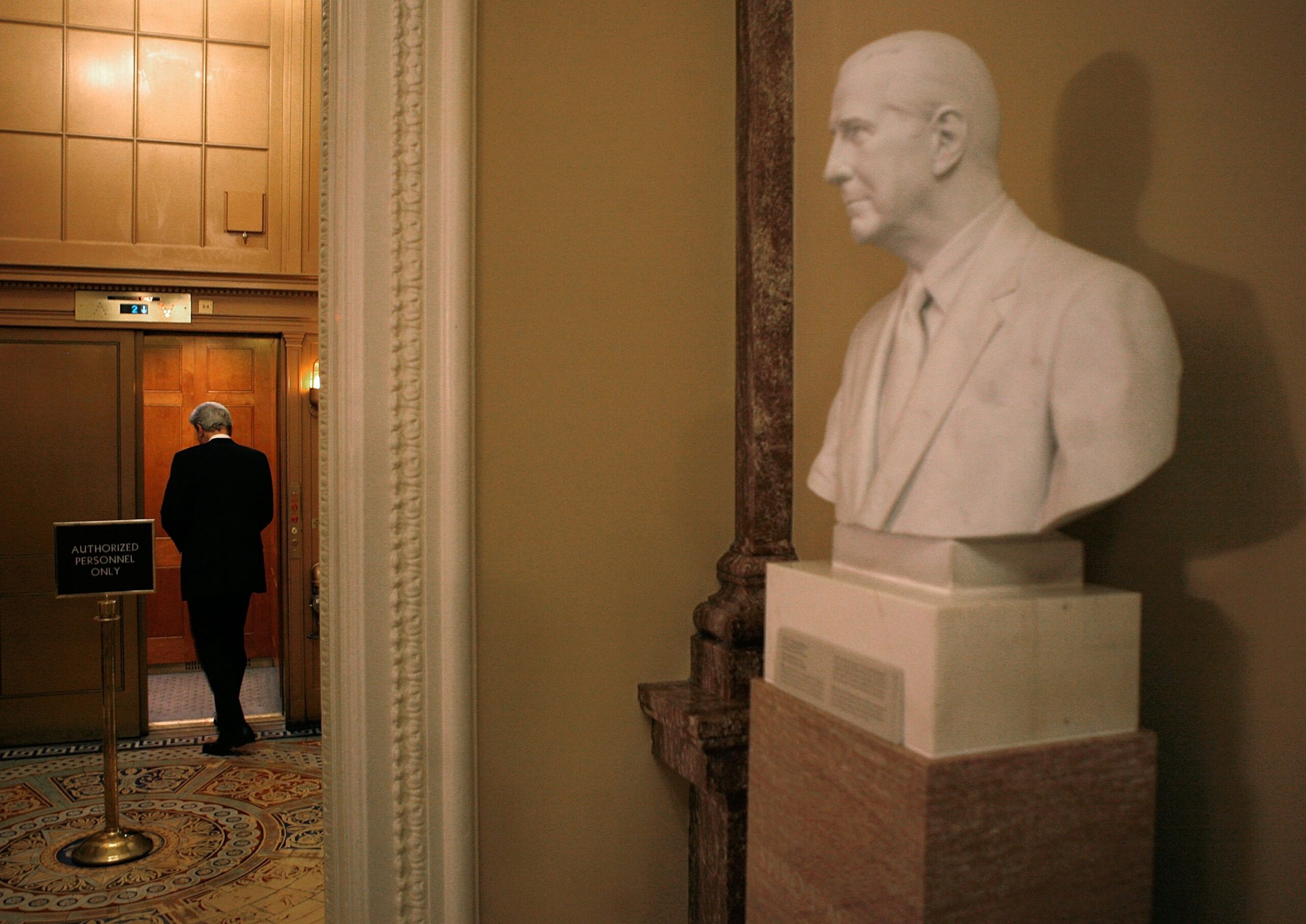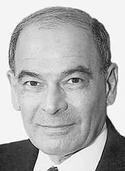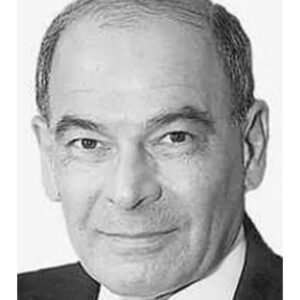
The raspy sound you hear in the background is the ghostly voice of Spiro T. Agnew whispering in Gov. Larry Hogan’s ear Shakespearean warnings to be wary about what’s being thrust upon him.
Comparisons suck, to roughly paraphrase the poet once more. Before Hogan admirers twist themselves into knots, this has nothing to do with Agnew’s affinity for white envelopes and his ambassadors to the wonderful world of money.
It is, simply, an analogy, as Agnew was the last, and only, Maryland politician to come ever so close to the White House if only he’d kept his mouth shut and his fingers out of the tambourine. (Baltimore native Nancy Pelosi is third in line for the presidency.) And that is discounting John Hanson, a Marylander who was de facto president, when none existed, as president of the Continental Congress.
Agnew’s arc of ascendency is the narrative line. Hogan faces the same inherent risk. Agreed: Their names don’t belong in the same sentence.
Hogan, an affable fellow and a nimble politician with strong survival instincts, has evolved as a raging moderate and irrepressible centrist among a nest of Democrats where he began as a pinch-penny fiscal conservative with a penchant for small government. That epiphany, along with his personal popularity, has rendered him attractive to what few remain of like-minded traditional Republicans who are searching for a willing antidote (if not antagonist) to President Trump.
Here the echolalia kicks in. Agnew’s career track was similar in some ways, but roundabout in others. He began political life as a Democrat and PTA president who reincarnated himself as a Republican to clear a pathway for advancement in Baltimore County, which was dominated by Democrats. Agnew, like Hogan, was elected governor as an alternative to an unacceptable Democrat – George P. Mahoney in Agnew’s case and Anthony Brown in Hogan’s.
Agnew was a moderate-to-liberal (by 1960s standards) county executive and governor, a civil rights advocate whose transformation began when he felt misled by the liberal Nelson Rockefeller and, later, betrayed by black leaders whom he berated publicly and caught the attention of national Republicans who needed a stern advocate for Richard M. Nixon’s “law and order” campaign in 1968. Speechwriter Pat Buchanan’s incendiary vocabulary in Agnew’s fire-breathing mouth was the acceptable answer.
At governors’ conferences long before his nomination, Agnew was admired by the ogling national corps of reporters. The observations were along the lines, “Agnew would make a great vice-presidential candidate. What a shame he’s from a small state like Maryland.”
Hogan has been mentioned by several commentators as a possible alternative candidate to Trump in 2020, flattering attention but one that has all the telltale signals of a set-up and a fall. It has been reported that Hogan’s inaugural speech was cleared by William Kristol, an outspoken anti-Trump Republican of whatever GOP degree or leaning he calls himself today.
And former Florida Gov. Jeb Bush, a moderate from a traditional Republican family of public officials, was on the dais to present Hogan to the voters who elected him to a historic (for a Maryland Republican) second term. Other GOP recruiters are dialing up Hogan as well.
Hogan, in June, assumes the chairmanship of the bipartisan National Governors Association, which will offer up a national platform with access to the ubiquitous national press, all of the ingredients necessary to offer reasonable alternatives to Trump’s erratic behavior and tweetstorm presidency. Those who are seeking a hatchet man had better reconsider the word “bipartisan.”
But Hogan’s main credential is that he presides over a state that is unabashedly hostile to Trump – and growing more so because of the federal government shutdown. Trump lost Maryland by 26 points to Hillary Clinton in 2016. And Hogan has been pointed in his criticism of Trump, even openly saying that he wrote in his father’s name rather than vote for Trump – and that said after boycotting the Republican National Convention that nominated Trump.
The trapdoor for Hogan
Hogan was careful not to mention Trump by name in his modest inaugural critique of Washington, D.C., politics, an address that is usually reserved for uplifting tone and themes rather than strategies, programs or personal attacks.

Frank A. DeFilippo
And here’s the trapdoor for Hogan: The GOP apparatchiks and party ideologues have fingered Hogan as among the elected officials they’d like to have out front to advance their cause of defeating Trump in 2020 – whether the candidate is Hogan or someone else is irrelevant. Hogan is regarded, as born out by polls, as one of the two most popular governors in the country.
Agnew, too, was recruited to unleash his fiery invective, but on Democrats, an assignment he relished and fit his Dutch-uncle personality. (In his authoritarian way, Agnew resembled Trump). Agnew was introduced to Nixon by Maryland Republican doyenne, Louise Gore, and considered for the vice presidency only after a stamp of approval by Sen. Strom Thurmond, of South Carolina, the original Dixiecrat and segregationist. So expect Hogan to be a frequent guest in the GOP salons of Washington, and expect the governor’s mansion to become a possible staging area.
Agnew held a fundraiser for Nixon at the governor’s mansion in June 1968. At an impromptu news conference on the mansion steps, Nixon said: “I assure you that if I’m elected, there’ll be two piano players in the White House.” Both men played passable sing-along piano – by ear, as the saying goes.
Agnew became Nixon’s Nixon, doing the president’s dirty work, delivering anti-welfare and law-and-order speeches in Palookavilles, such as Casper, Wyo., and Billings, Mont., and finally, an anti-communist campaign wrap-up speech (for whatever reason) at a homecoming rally at Towson University.
Agnew’s reward? He failed to deliver his home-state of Maryland for the Nixon-Agnew ticket in a massive turnout of black supporters for Democrat Hubert H. Humphrey. Early on election night, Nixon called Agnew and said: “If I lose this election because of you and Maryland, your career in politics is over.”
But once Nixon and Agnew were elected and sworn into office, Agnew was denied access to the White House and the president by Nixon’s gatekeepers, H.R. Haldeman and John Ehrlichman, and rarely to be heard from again until he was brought down in a bribery-kickback paper trail that led back to his days in Maryland.
The Haldeman-Ehrlichman blockade was so stunning and thorough that Agnew was reduced to asking the assembled governors at their annual conference in San Juan, P.R., in September 1971, to adopt a resolution requesting that the White House designate him as liaison to the governors so he’d have a legitimate function.
Efforts to dump Agnew from the Nixon ticket in 1972 fell flat. By then, Agnew had attracted a constituency of his own admirers of his forceful, vitriolic speeches who would have rebelled.
The risk for Hogan, who is now straddling state politics and national attention, is the posse of freelance gunslingers who would like to use him as a foil against Trump. Many are consultants seeking paying candidate-clients. Hogan has said little about political ambitions beyond Maryland. And when he speaks, he employs the vocabulary of a gentle hint and not a slashing indictment, as in his inaugural address:
“Let’s repudiate the debilitating politics practiced elsewhere – including just down the road in Washington – where insults substitute for debate, recriminations for negotiation, and gridlock for compromise; where the heat, finger-pointing and rancor suffocates the light, and the only result is divisiveness and dysfunction.”
That was supposed to be the showstopper in the speech, and it did draw a standing ovation. But it’s hardly a match for the incendiary and reckless – and it is entirely appropriate to add ungrammatical and often incoherent – rants that Trump issues daily. No less would be expected of the anti-Trump point man. Agnew would be the man to ask if he were still around.
“Be not afraid of greatness; some are born great, some achieve greatness, and others have greatness thrust upon them,” Shakespeare wrote in Twelfth Night.
Tread lightly, and carefully. Be wary of those who thrust.




 Creative Commons Attribution
Creative Commons Attribution